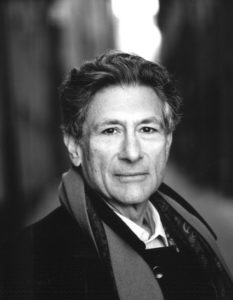Edward Said (original) (raw)
Life and Career
Edward W. Said was born in Al_–_Quds (Arabic: القدس ), the capital of Palestine ( now Jerusalem ) on 1 November 1936 and died on 25 September 2003 in New Yok City. Heir to a wealthy Palestinian Christian family, he soon moved to Cairo where he attended Victoria College. Among his companions was the future King of Jordan Hussein, and Omar Sharif.
 The young Edward soon rebelled against the formation of the so-called wog (Westernized Oriental Gentlemen) and was sent by his father, an ambitious and demanding businessman, to a boarding school in Massachusetts, with the aim of obtaining American citizenship for his son. In 1948, the Said family was expropriated of all their assets, and the young Edward became a refugee deciding to fight for the rights of the Palestinian people and a bi-national, secular and democratic state.
The young Edward soon rebelled against the formation of the so-called wog (Westernized Oriental Gentlemen) and was sent by his father, an ambitious and demanding businessman, to a boarding school in Massachusetts, with the aim of obtaining American citizenship for his son. In 1948, the Said family was expropriated of all their assets, and the young Edward became a refugee deciding to fight for the rights of the Palestinian people and a bi-national, secular and democratic state.
He became a professor of English and Comparative Literature at Columbia University in New York. Trained at Princeton and Harvard, Said taught over one hundred and fifty universities and schools in the United States, Canada, and Europe. Since his thesis on Joseph Conrad, he dealt with colonialism, and he was among the first to introduce radical criticism to the western humanism of Michel Foucault in the USA. He received an international academic fame after a typically post-structuralist book entitled “Beginnings: Intention and Method” (on the topic of the beginning and the impossibility of origin), along with the fundamentals of Orientalism, a massive study that documents and dismantles the idea that the West has constructed its cultural, and ideological constitutions on the Near East.
At the same time, he did not stop teaching and pursuing his research in literature and music. As a practicing professional pianist, he participated in discussions with his friend Daniel Baremboim, the Israeli conductor, on Wagner (his old passion).
Edward W. Said has always struggled for the dignity of his people, against the Israeli occupation, and against those who demonize Islam. He opposed the Oslo accords and the power of Yasser Arafat (who had his books banned in the autonomous territories) because Said believed he was too weak in defending Palestinian national interests. His political writings appeared regularly on The Guardian, Le Monde Diplomatique and Arabic journal Al-Hayat, as well as in Italian on International, Zmag Italy, REDS, Le Monde Diplomatique Italy, Il Manifesto, La Repubblica.